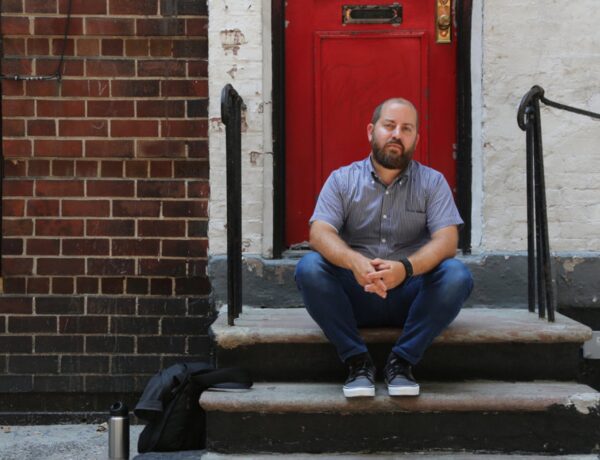Anthony Varallo is the author of a novel, The Lines, as well as four short story collections: Everyone Was There, winner of the Elixir Press Fiction Award; This Day in History, winner of the John Simmons Short Fiction Award; Out Loud, winner of the Drue Heinz Literature Prize; and Think of Me and I’ll Know.
Currently he is a professor of English at the College of Charleston, where he is also the fiction editor of Crazyhorse.
Looking for inspiration to help you achieve your writing goals? Subscribe to our newsletter for exclusive insights into the routines, habits, and techniques of some of the most celebrated authors in history.
Hi Anthony, welcome to Famous Writing Routines, great to have you here with us today! As the winner of multiple awards for your short story collections, what inspired you to write The Lines, your debut novel?
The Lines began with a personal challenge. I wanted to try and write a novel from multiple perspectives that would still somehow have the tension and compression of a short story. I knew the novel would span approximately one summer—which later became the summer of 1979 during the US gas crisis—but I really didn’t know too much else.
As I began writing, the story began to reveal more and more of itself to me, mostly by me following my characters around, asking, “What is life really like for them? What are their secrets, fears and longings?” I was inspired by nearly every novel I’ve read that finds something extraordinary about ordinary life.
Your short story collection This Day in History won the John Simmons Short Fiction Award. Can you discuss your process for writing short stories?
The process is different for each story, but most of the time my stories start with a small observation, image, or memory. I used to jot these down in a notebook, but now I write them in my iPhone Notes app. The notes wouldn’t look like anything worthwhile to anyone else but me. Just stray lines of dialogue or the outline of a moment.
The only thing the notes have in common is that they make me feel something. If I have a goal for the story, it’s that the story will give the reader the same kind of emotion when they read it. But it takes forever to get there. Most of my writing life is me staring at a computer screen, thinking, “I have no idea what happens next.”
As a professor of English at the College of Charleston and the fiction editor of Crazyhorse, how do you balance your academic responsibilities with your writing life?
I don’t! Teaching is always going to demand more of you than you bargained for, so you just have to accept that. Most of my energy goes into teaching from fall through spring. In the summer, I can focus more on my writing. The only requirement for editing a literary journal is that you love the work; otherwise, it will wear you down. The good news for me is that I love editing, so it doesn’t distract from my writing and teaching life too much.
Discover the daily writing habits of authors like Stephen King, Neil Gaiman, and Gillian Flynn with Famous Writing Routines Vol. 1 and learn how to take your writing to the next level. Grab your copy today!
How has your role as the fiction editor of Crazyhorse influenced your writing process and style?
Being an editor has helped me realize just how many talented writers are out there (a ton!) and how lucky I’ve been to get my work out into the world. I don’t think being an editor has changed my writing style, but it has helped me deal with rejection, and somehow that, in turn, helps me keep going as a writer. I tell my students that I often get rejected while rejecting, which I guess is some kind of karma. (I will probably get rejected while answering this interview.)
What does a typical writing day look like for you?
I get up in the morning, make coffee, eat breakfast, and then waste half an hour online. After that, I open a story I’m working on, or maybe open up a new document with the hope of beginning a story, and stare at it for a while. I scroll through whatever I’ve written and try to remember what I liked about it, what drew me to this story in the first place.
Sometimes I will read a few sentences aloud, just to have a feel for the way they sound. That usually helps me start writing. If not, I will take a book from my shelf and read for a little while, not too long, just enough where I’m ready to make some sentences of my own. If it’s a good morning, I can write for two hours. Three, if it’s a great morning. But honestly, I’m happy with an hour and a half, if that’s all I get. I can feel okay about writing 400 words and calling it a day. As you can tell, I’m a slow writer.
If you could have a conversation with any author throughout history about their writing routine and creative process, who would that be and why?
So many! Too many to choose from! I’ve always liked a story I’ve heard about John Cheever, that when he was first writing short stories for The New Yorker, he used to dress up in a suit and tie and wait for the elevator with all the other “respectable” neighbors in his apartment building. But when they got off the elevator on the ground floor, Cheever would take the elevator to the basement, where had set up a makeshift writing desk in a boiler room. There, he would write short stories until he returned home at night, a guy in a suit and tie returning home from a long day at the “office.” So I guess I would say Cheever, so I could ask him if that story is true.
What books, writers or events have had the greatest impact on your writing life and why?
Books: I know it’s kind of obvious to say The Great Gatsby, but that book really did make a huge impression on me when I first read it for 8th grade English class. It was the first time a teacher had ever assigned a novel that wasn’t about kids or children, and didn’t have anyone named Huck, Scout, or Holden in it (though those are great books too). That book made me want to write something “grown up” of my own.
Writers: I’ve been lucky to have some great writing teachers in my life, but the most important for me was my first writing teacher in college, Bernie Kaplan, who gave me the greatest writing advice I’ve ever received: “Stop trying to show the reader how smart, clever, funny, sensitive, talented, and well-read you are, and just tell them a story instead.” Without a doubt, having children has had the greatest impact on my writing life. My kids have made writing all the more worthwhile in so many ways.
What does your current writing workspace look like?
A mess, thanks for asking! I write at my desk and at my “puff rocker” rocking chair, a leftover from my graduate school days. I usually have a legal pad out for taking notes, plus whatever stray books end up on my desk. My desk is the cheapest desk available from a big box retailer whose name I will not mention here. $42!
Affiliate disclaimer: Some links on this website are affiliate links. We may earn a small commission if you make a purchase through these links, but only promote products we truly believe in. We disclose affiliate links and give honest reviews.



No Comments